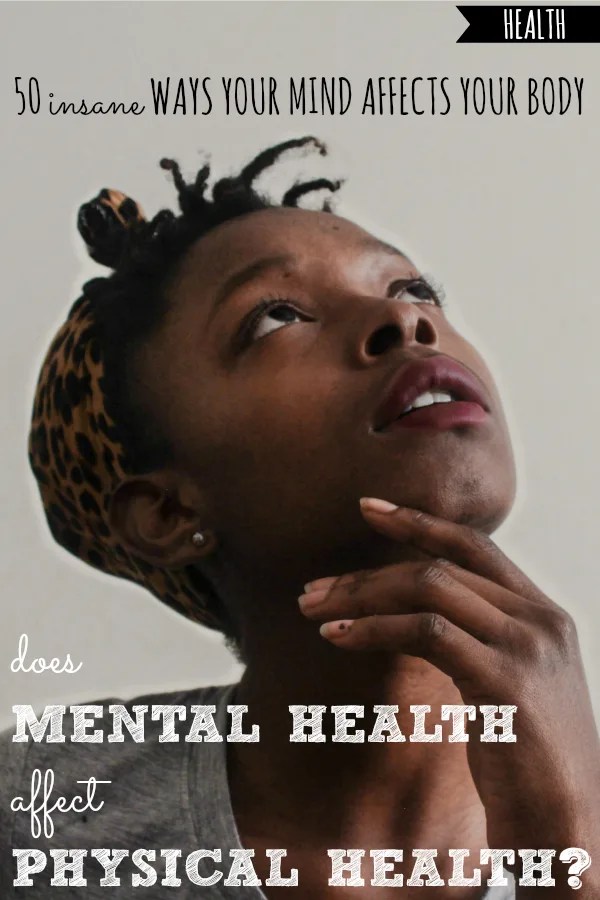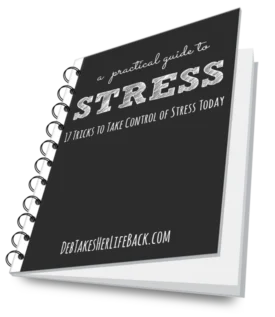Does Mental Health Affect Physical Health? You Might Be Shocked!
Does mental health affect physical health? If you’ve ever experienced a stress-induced headache or indigestion, you already know the answer.
But your mental state affects your physical health much more than you might imagine!
For example, did you know that anxiety has been linked to diabetes, heart disease, and gastrointestinal disorders? Or that depression is more likely to cause heart attack recurrence than smoking, diabetes, or high blood pressure?
How is this possible?! It all starts with stress.
Stress Affects Physical Health
Our bodies were created to effectively manage stressful situations, from our ancestors fighting off wild animals, to our impending deadline at the office. When we perceive stressful conditions, our heart rate and blood pressure increase, and our stress hormones become elevated, all to help us effectively manage the stressful circumstances.
But these physical responses are only intended to act temporarily, to manage the stressor and then return to a baseline. Unfortunately, many of us today are living in a state of chronic stress.
When you’re always stressed, your stress-response system is always activated. Therefore your heart rate, blood pressure, and stress hormones are constantly elevated. And that can wreak havoc on your body, by causing:
- Headaches
- Migraines
- Muscle tension
- Muscle pain
- Chest pain
- Fatigue
- Change in sex drive
- Upset stomach
- Stomach ulcers
- Digestive issues
- Sleep problems
- Rapid breathing (that could induce panic attacks)
- Inflammation
- Affected cholesterol levels
- Increased risk for hypertension
- Increased risk for heart attack
- Increased risk for stroke
- Increased risk for diabetes for the obese and races more inclined to diabetes
And that’s just how stress can affect you directly. It can also indirectly affect your body by altering your mood, causing:
- Anxiety
- Sadness or depression
- Feelings of overwhelm
- Lack of motivation
- Lack of focus
- Irritability
- Anger
These emotions often lead to unhealthy coping mechanisms, like overeating, undereating, abusing drugs or alcohol, exercising less often, or withdrawing from others. And each of these coping strategies comes with its own negative impact on your physical health.
Keep in mind that these are the physical effects of stress alone. All by itself. Anxiety and depression piggyback on these effects to take their own powerful toll on your physical health.
Anxiety Affects Physical Health
The initial fight-or-flight response of anxiety is similar to that of stress. It includes an increase in heart rate and respiration, muscle tension, and a diversion of blood flow from abdominal organs to your brain.
But the physical effects of chronic anxiety are much more severe. They include all of the physical symptoms of stress, in addition to:
- Trembling
- Numbness or tingling in the hands
- Dizziness
- Weakness
- Nausea
- Diarrhea
- Frequent urination
- Shortness of breath
- Feeling cold or overheated
- Excessive perspiration
- Rapid heart rate
- Palpitations
- Insomnia
- General feeling of ill health
- Clinical depression
- Decreased vaccine effectiveness
- Increased risk for viral infections
- Increased risk for heart disease
- Increased risk for chronic respiratory disorders
- Increased risk for gastrointestinal conditions
- Increased risk for heart attack for those that have heart disease
Depression Affects Physical Health
Depression affects the body differently than stress and anxiety. It causes neurological changes in the brain, by altering neurotransmitter production and receptor site function.
And these neurological changes can affect many of the body’s systems. For example, abnormal functioning of serotonin (a neurotransmitter) can result in lower sex drive and pain threshold.
Some of the main physical effects of depression include:
- Chronic fatigue
- Increased aches and pains
- Decreased sex drive
- Sleep problems, which could include insomnia, lack of deep sleep, or oversleeping
The longer you experience these symptoms, the more they compound to increase your risks for disease complications, heart disease, substance abuse, and dying after a heart attack.
Depression sufferers also experience a greater challenge following instructions, taking medications, and committing to a consistent treatment schedule. This may make it harder for them to recover from health issues.
Mental Health Affects Physical Health…What We Can Do With This Knowledge
Does mental health affect physical health? Absolutely! So what can we do about it?
First, acknowledge the importance of mental health.
The minute I have a swollen, sore throat, I’m off to urgent care for a Z-pack. But when I thought I might be experiencing depression, I put off a doctor’s visit for months.
Why don’t we prioritize our mental health as much as our physical health? I hope this post makes it clear that your mental health has serious physical consequences, and can actually cause you to develop physical diseases.
Second, make a plan to deal with stress.
Several studies have found that stress management is nearly as effective as medication for controlling blood sugar levels, pain tolerance, and more. By taking regular precautions to avoid stress, and making a plan to deal with it in the moment, you can drastically decrease your chances of experiencing stress-induced symptoms.
And finally, talk to your doctor.
If you believe you might be experiencing anxiety, depression, or mental illness, it’s absolutely critical that you make an appointment with your doctor. Mental dysfunction doesn’t just go away on its own.
Your doctor can discuss potential solutions, which may include counseling, medication, and more.

Does mental health affect physical health? It absolutely does, through the long-term effects of stress, anxiety, and depression.
So if you’ve been experiencing chronic headaches, weakness, insomnia, or other symptoms, be sure to consider your mental health as a possible root cause. By making a plan to deal with stress, and working with your doctor, you may be able to significantly improve your physical health.
As Gandhi once said, “It is health that is real wealth and not pieces of gold and silver.” Make your health a priority today!

P.S. Miss the link to our free stress management guide? Nab yours here!
Disclosure: While all opinions are our own, we are a participant in the Amazon Services LLC Associates Program and other affiliate advertising programs, designed to provide a means for us to earn fees by linking to Amazon.com and affiliated sites, at no additional cost to you.



